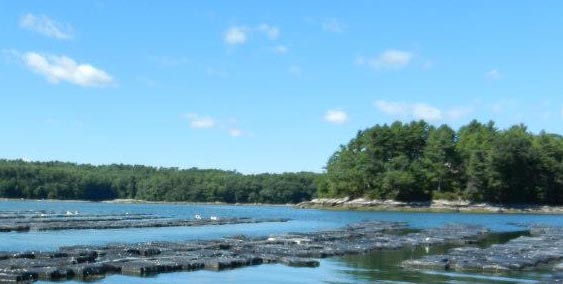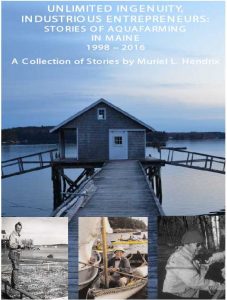
New Book Provides Historical Perspective on Maine Aquaculture
 Liz Theriault, ME EPSCoR Student Writer
Liz Theriault, ME EPSCoR Student Writer
ME EPSCoR support helps with 2019 launch
Since the 1980s, aquaculture has expanded at an impressive rate in the state of Maine. Maine has a long legacy of aquaculture dating back to the 1800’s, though earlier efforts looked much different from today’s modern farms. While always present in Maine’s economy and ecosystems, it wasn’t until around the 1970’s that aquaculture production in the state began to significantly expand. Muriel Hendrix, writer and reporter, has witnessed and written about that sudden, expedited growth, and recently collected her stories into one comprehensive book: “Unlimited Ingenuity, Industrious Entrepreneurs: Stories of Aquafarming in Maine 1998-2015.”
When Hendrix first became a reporter, she covered a variety of topics for a number of newspapers and magazines, until she landed one story that spurred her interest in Maine’s aquaculture industry.
“I just fell into aquaculture. I started with covering water quality, and I did a profile on John Hurst for The Working Waterfront about his research in Casco Bay on red tides,” said Hendrix. “And eventually, one aquaculture story led to another.”
When her time as a reporter came to a close, Hendrix realized that she wanted to preserve her work. She paired up with the Maine Aquaculture Innovation Center to create this new aquaculture text.
The book holds the collection of Hendrix’s articles that highlight the Maine aquaculture sector. The book is both a historical perspective and an instructional guide that continues to be relevant today. Individuals interested in getting into Maine’s aquaculture business can see how the industry has evolved over the years, and how others have overcome obstacles and found success.
“About a year ago, Muriel decided to take about 150 of the stories she’s written and combine them all together into a book format. So we have been working on that with help from Maine EPSCoR, and Robbie Mills, our SEANET supported intern,” said Chris Davis. “We will have chapters on shellfish, finfish, sea vegetables, fish farming, [aquaculture] sources, marketing aquaculture products, education and infrastructure support. In each chapter we have asked a guest author to write an introduction to the chapter.”
The book was launched at the 2019 Northeast Aquaculture Conference and Exposition in Boston, Massachusetts, and is currently for sale on the Maine Aquaculture Innovation Center website. Aquaculture enthusiasts, industry members, scholars, and anyone with a general curiosity for the history of Maine’s aquaculture can purchase the book for $30.
